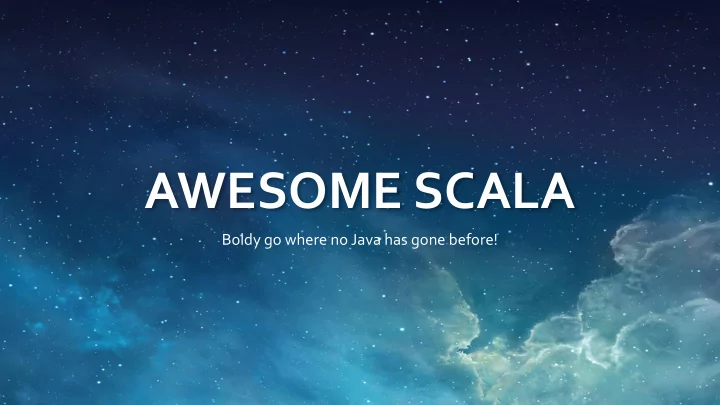

AWESOME SCALA Boldy go where no Java has gone before!
so..... We can port Java programs...
No Boilerplate public class Main { public static void main(String[] args) { System.out.println("Hello World"); } } object Main { def main(args: Array[String]) { println("Hello World"); } object Main extends App { } println("Hello") object Main extends App { println("World") println("Hello World"); } } NO BOILERPLATE!!
For-Comprehensions val books = List( Book("How to use the Holodeck", 20), Book("How to win Kobayashi Maru", 800) ) var ls : List[ Int ] = List() for (b <- books) { var ls = for (b <- books) yield b.price ls = ls :+ b.price } var ls : List[ Book ] = List() for (b <- books) { var ls = for (b <- books if (b.price < 100) if (b.price < 100)) yield b ls = ls :+ b } No Boilerplate…
For-Comprehensions val books = List( Book("How to use the Holodeck", 20), Book("How to win Kobayashi Maru", 800) ) val stores = List( Store("Khan – Books and Revenge", "30000m"), Store("Warp Library", "10m") ) var ls = for ( b <- books s <- stores if (b.price < 100)) yield { (b.name, s.name) }
Take Home Points No Boilerplate var ls = for (b <- books) yield b.price yield : Allow us to map values No Boilerplate!! var ls = for ( b <- books For Comprehensions allow simple Syntax s <- stores if (b.price < 100)) No return needed – Simply last value returned yield { (b.name, s.name) } But: Even if it’s ugly… Java can do the same!
Higher-Order Functions Lambda Functions val ls1 : List[ Int ] = List(4,3,2,1) val ls2 = ls1.sortWith((e1, e2) => e1 < e2) (e1, e2) => e1 < e2 (e1 : Int , e2 : Int ) => e1 < e2 ( Int , Int ) => Boolean
But can’t we do the same in Java 8? Well… Java 8 can do Lambda Functions ( Int e1, Int e2) -> e1 < e2; But Scala can even more!! Functions = First Class Citizen var f1 = (x : String ) => println(x) f1("Hello World") def foo(f: String => Unit ) { f("bar") } foo(f1)
Take Home Points Functions are First Class Citizens def foo(f: String => Unit ) { var f1 = (x : String ) => println(x) f("bar") } Treat functions like objects in Java Scala is typesafe – It can infer types! Reduce Boilerplate.. again
Pattern Matching case class Book(name : String , price : Int ) Case Class are like a n ormal Class, but… • Provide Apply/Unapply Functions • Provide equals Function case class Store(name : String , distance : Int ) var anything : Any = Book("How to use the Holodeck", 20) anything match { case b : Book => println(b.name) case _ => println("Error") } wildcard
Pattern Matching var anything : Any = Book("How to use the Holodeck", 20) anything match { case Book(name, 10) => println("Cheap: " + b.name) case Book(name, price) if (price > 300) => println(b.name) case Book(name, price) => println("Some Book: " + name) case _ => println("No Book") } No more if – else or switch for checking values… We can just use Scala Pattern Matching!
Pattern Matching try { ... } catch { case ioe: IOException => { ... } case se: SQLException => { ... } } val (x,y,z) = (1,2,3) Examples val ls : List[ String ] = List("Foo", "Bar", "Baz") ls match { case Nil => println("This list is empty") case e::Nil => println("One Element: " + e) case h::t => println("Head Element: " + h + " and some tail") case _ => println("no match") }
Take Home Points You can match nearly anything using match Case Classes are specifically designed for pattern matching (As they provide Apply/Unapply and equals ) No More Type-Casting – Use Pattern Matching!
To boldly go, where no Java has gone before!
Recommend
More recommend